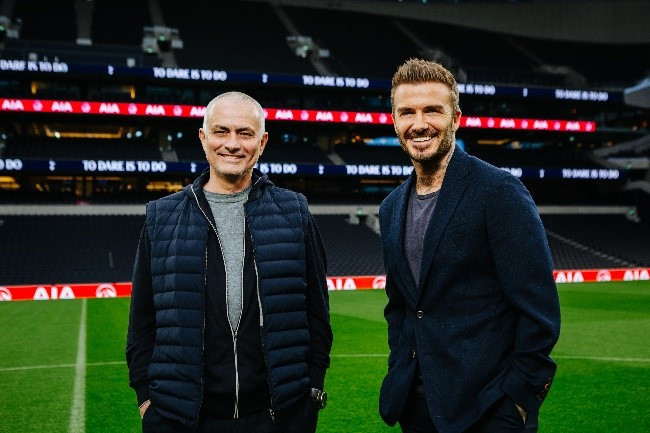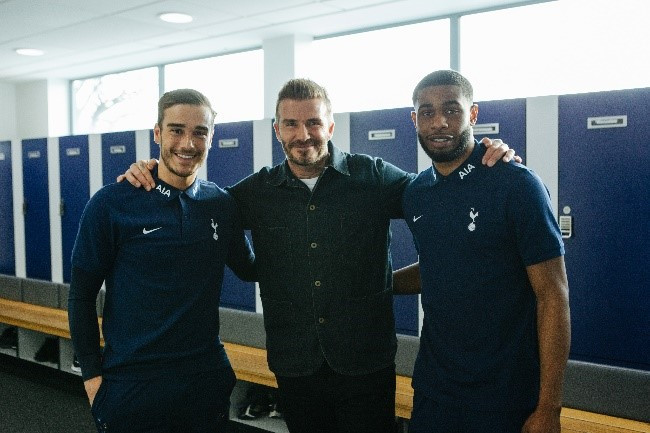Popular Reads
Top Results
Can't find what you're looking for?
View all search resultsPopular Reads
Top Results
Can't find what you're looking for?
View all search resultsAIA, Beckham and Spurs team up for mental health awareness drive
AIA global ambassador David Beckham and Tottenham Hotspur manager Jose Mourinho held an unprecedented talk at the Spurs’ stadium in London, the United Kingdom.
Change text size
Gift Premium Articles
to Anyone
A
IA global ambassador David Beckham and Tottenham Hotspur manager Jose Mourinho held an unprecedented talk at the Spurs’ stadium in London, the United Kingdom, with particular emphasis on mental health concerns among football players. The meeting is part of an AIA Indonesia video series available on its YouTube channel.
According to Mourinho, who is also head coach at the Tottenham Hotspur Academy, which was prompted to focus on mental health, one of the toughest issues facing its students, so its students could stay productive.
“I think it is more difficult to cope with the social pressure than the football pressure,” says Mourinho, in the context of delaying entry to the academy. “That’s the toughest part. If you feel pressure to be here, you don’t belong here. If you feel pressured because you want to be a normal kid with 20-25 years old and the world doesn’t let you, that is a different thing.”
“In the [Spurs] academy, I think they focus a lot on this part and help them to cope [with] what is waiting for them outside,” he adds.
“We’re very lucky now to be in an era where it’s acceptable to talk about struggles and different things. It is not a weakness anymore,” says Beckham.
Beckham and Mourinho both believe that discussing and talking about problems is a good step to maintaining mental health.
Why is mental health essential, not only for athletes, but also for everyone?
Beckham poses for a picture with Tottenham Hotspurs playersIt is important to understand first what is meant by mental health and how it relates to our lives. The World Health Organization (WHO) defines mental health as “a state of well-being in which an individual realizes his or her own abilities, can cope with the normal stresses of life, can work productively and is able to make a contribution to his or her community”.
“Mental health is fundamental to our collective and individual ability as humans to think, emote, interact with each other, earn a living and enjoy life. On this basis, the promotion, protection and restoration of mental health can be regarded as a vital concern of individuals, communities and societies throughout the world,” the WHO states in its fact sheet on mental health.
Mental health has become a urgent global issue that needs to be addressed, especially in the context of the COVID-19 pandemic. The health crisis has prompted many countries to impose lockdowns to curb the spread of the coronavirus. Some, if not many, people have been affected mentally by being stuck at home for more than three months. Indonesia, however, has imposed physical distancing and the large-scale restrictions (PSBB) instead of a lockdown.
According to United Nations health experts, a mental illness crisis is looming as millions of people worldwide are surrounded by death and disease and forced into isolation, poverty and anxiety by the COVID-19 pandemic.
"The isolation, the fear, the uncertainty, the economic turmoil – they all cause or could cause psychological distress," said Devora Kestel, the mental health and substance abuse director at the WHO.
Under the “Symptoms & causes” tab on its mental illness webpage (https://www.mayoclinic.org/diseases-conditions/mental-illness/symptoms-causes/syc-20374968), the American nonprofit Mayo Clinic says: “Mental illness, also called mental health disorders, refers to a wide range of mental health conditions – disorders that affect your mood, thinking and behavior. Examples of mental illness include depression, anxiety disorders, schizophrenia, eating disorders and addictive behaviors.
“Many people have mental health concerns from time to time. But a mental health concern becomes a mental illness when ongoing signs and symptoms cause frequent stress and affect your ability to function.”
Beckham (third from left) speaks with Spurs Academy Manager Dean Rastrick and Spurs Head of Academy Coaching and Player Development John MC Dermott (second from left) and Spurs playersImproving mental health
But mental illness does not mean that it cannot be cured. Here are some things to consider when trying to improve your mental health during the COVID-19 pandemic and the “new normal”:
- Maintain self-esteem: When it comes to heightened anxiety due to COVID-19, try to relax and focus on positive things, knowing that every effort is being made around the world to bring this situation to a close, but that it will take time. It is very important to think positive and to maintain self-esteem.
Positive thoughts also have positive effects on your physical health, such as boosting your immune system and cardiovascular health. People with high self-esteem have better social relationships and a more fulfilling life. Those with low self-esteem tend to be more vulnerable to emotional and mental health concerns, such as anxiety and depression.
- Distraction is always better: Depression can make you feel lonely and decide to cut yourself off from the world. Distract yourself with things you like, such as watching a movie, playing your favorite games or finding a new hobby. This will help keep your mind busy and channel your stress elsewhere, which will make room for better, more positive thoughts.
- Talk to someone: The best way to maintain your mental health is to connect with people. Expressing and sharing how you’re feeling with friends and family help release stress and clear the mind. The more you interact and share your concerns with others, the easier and lighter you will feel about the issues that are troubling you.
- Get enough sleep: Many people become preoccupied with problems in life and work that they forget to get enough sleep. Lack of sleep can cause bad or unstable moods, an inability to concentrate and other emotional or behavioral impacts. Get at least seven hours of quality sleep a day for your overall health.
- Exercise regularly: Follow a simple exercise regimen at home, like walking, and keep to it regularly. There are many options for all ages and abilities, like online videos on yoga and cardio workouts. Some are streaming videos that allow you to join a virtual exercise class that helps dispel feeling isolated. Whatever you choose, be sure to stick to it, whether it’s to a scheduled time or for the length of time.
- Choose quality foods: The food you eat highly affects your mental and physical health – after all, it’s the fuel that keeps your body going. Some people in countries imposing full lockdowns have developed signs of mental health disorders due to restricted access to healthy foods. Eat nutritious foods to keep your body, brain and health in tip-top condition. Above all, avoid processed foods and fast foods. The easiest way to do this is to add more fresh fruits and vegetables to every meal.
- Accept and understand your mental health: Many people refuse to accept that they’re feeling bad because of social pressure or cultural stigmas. Feeling bad is normal. Just accept it as fact and try to better understand why you’re feeling that way. Most of the time, it’s because of fear and anxiety over uncertain situations that we can’t control, which is also a normal reaction. If you can’t figure it out on your own, talk to friends and family or seek professional help to find the solution that best fits you. It all starts with acceptance.













